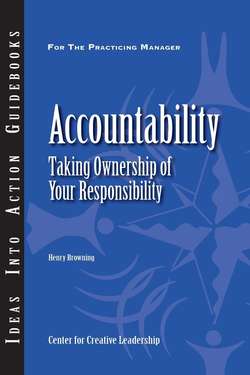Читать книгу Accountability: Taking Ownership of Your Responsibility - Henry Browning - Страница 8
На сайте Литреса книга снята с продажи.
ОглавлениеBeing Accountable
Organizations committed to developing their talent are constantly striving to push their managers to accept greater levels of responsibility. Official responsibility often comes from holding a particular position, but more and more managerial challenges require leaders to take initiative without having full authority for the process or the outcomes—in other words, to be accountable. Organizations spend a great deal of energy measuring engagement and fostering empowerment to develop a culture of accountability. These efforts are all designed to develop people so they can make sound decisions and be willing to stand behind those decisions. Organizations want people to take ownership of projects, processes, and problems that cut across lines of position and formal responsibility. In short, they are asking for higher levels of personal accountability from their employees.
But accountability is often difficult to define for organizations and even more difficult to articulate to those being developed within a talent pipeline. This guidebook is designed to provide a language and practical tools for developing norms and a culture of accountability in your team, group, or organization.
For the purposes of this guidebook, it is important that some distinctions be made between the terms accountability and responsibility. Often the literature uses these words interchangeably. For this particular model the following distinction will be made:
A person may be delegated the responsibility for a task by the boss, the organization, or by virtue of position. Accountability, however, refers to an acknowledgement and internalization of a sense of ownership for a task and the willingness to face the consequences that come with success or failure.
In leadership roles, accountability is the acknowledgment and assumption of responsibility for actions, products, decisions, and policies, including administration, governance, and implementation within the scope of the role or employment position and encompassing the obligation to report, explain, and be answerable for resulting consequences.
The challenge with accountability is that it is intrinsic, just like engagement and empowerment. An environment or culture that promotes accountability can be fostered, but the end result is totally dependent on the individual’s—or sometimes, as we will see later in this guidebook, the team’s—choice to act with greater accountability.
Much of the accountability literature attempts to make a distinction between people who act with great accountability and people who act as victims of circumstances and who are not willing to own the outcomes and ultimately the consequences of failed actions. The issue, however, may be less about victims and accountable people and more about creating the correct structures, systems, and support that will foster a culture of accountability—conditions that encourage people to fully own their decisions.
To be sure, most people seem to be more than willing to own success. But that is the crux of the problem: people will attempt to attach themselves to success, but if they are not just as willing to own their mistakes, organizational performance and learning will come to a standstill. Organizations will argue that their accountability issues arise only when people are unwilling to take ownership of failure.
